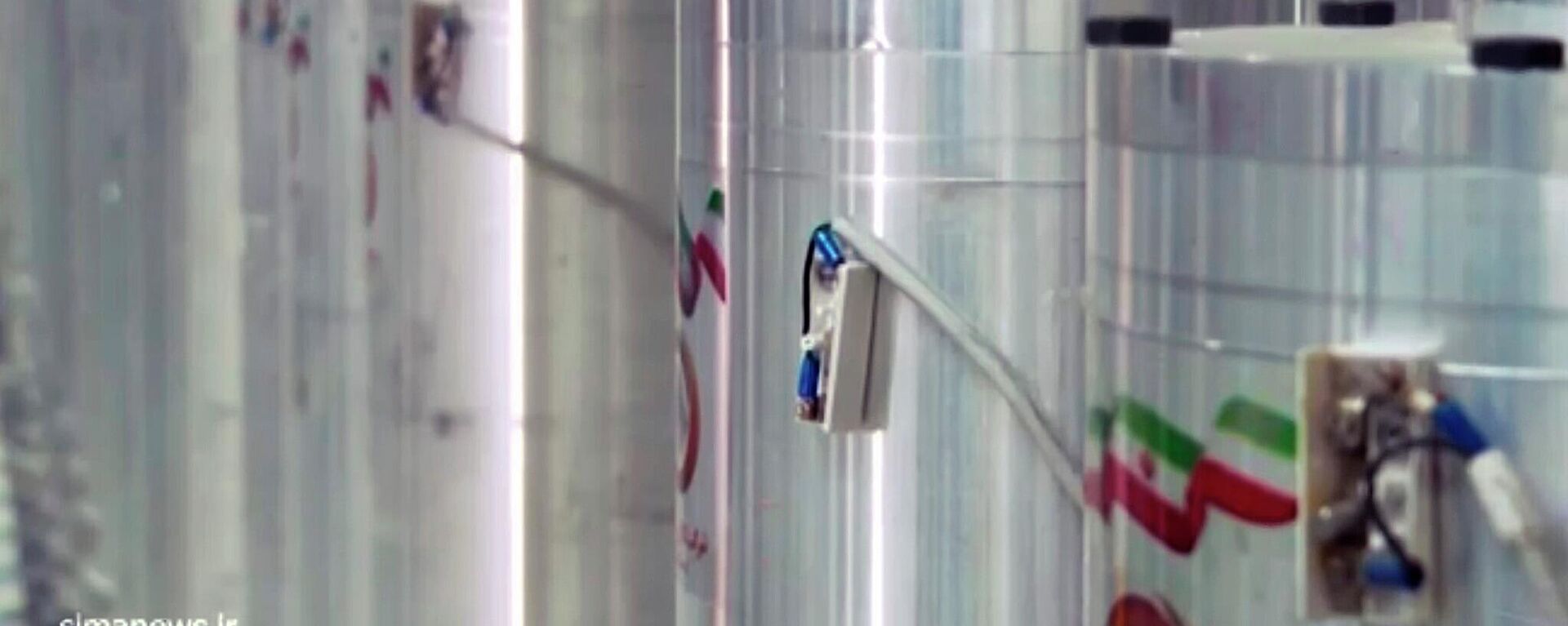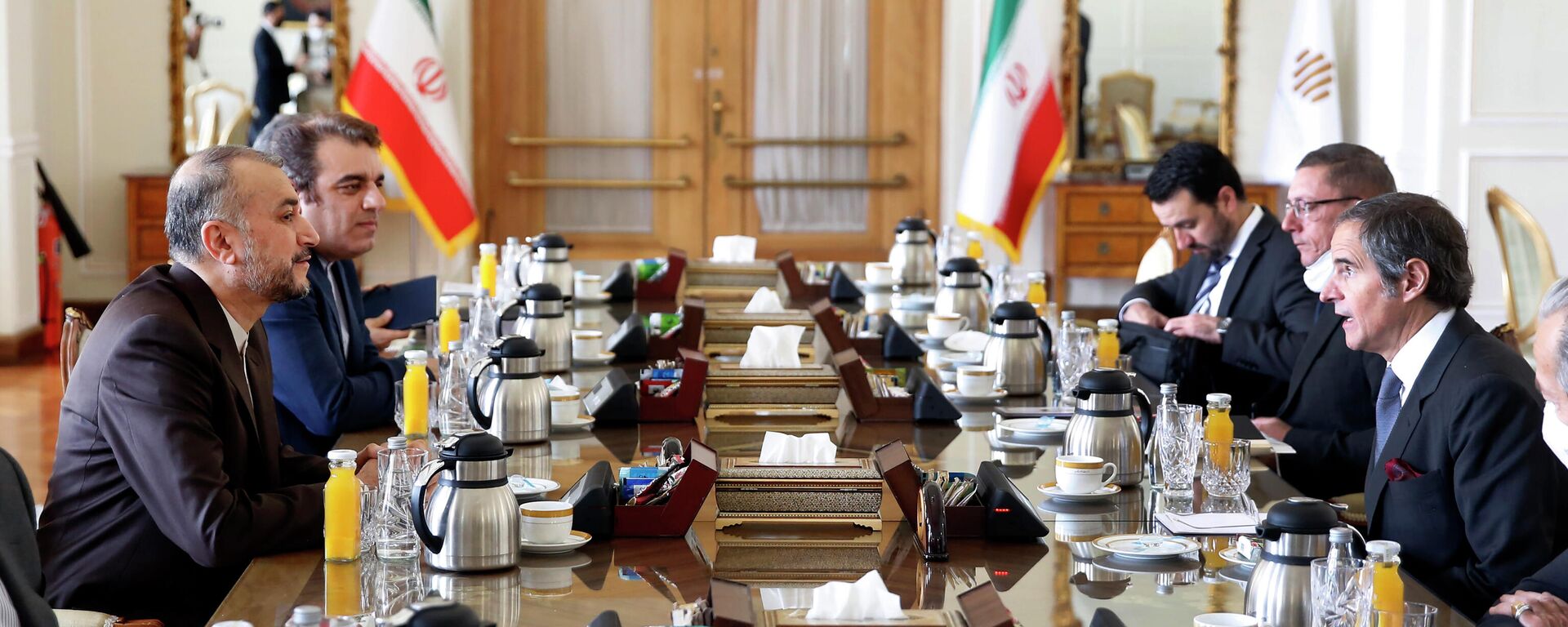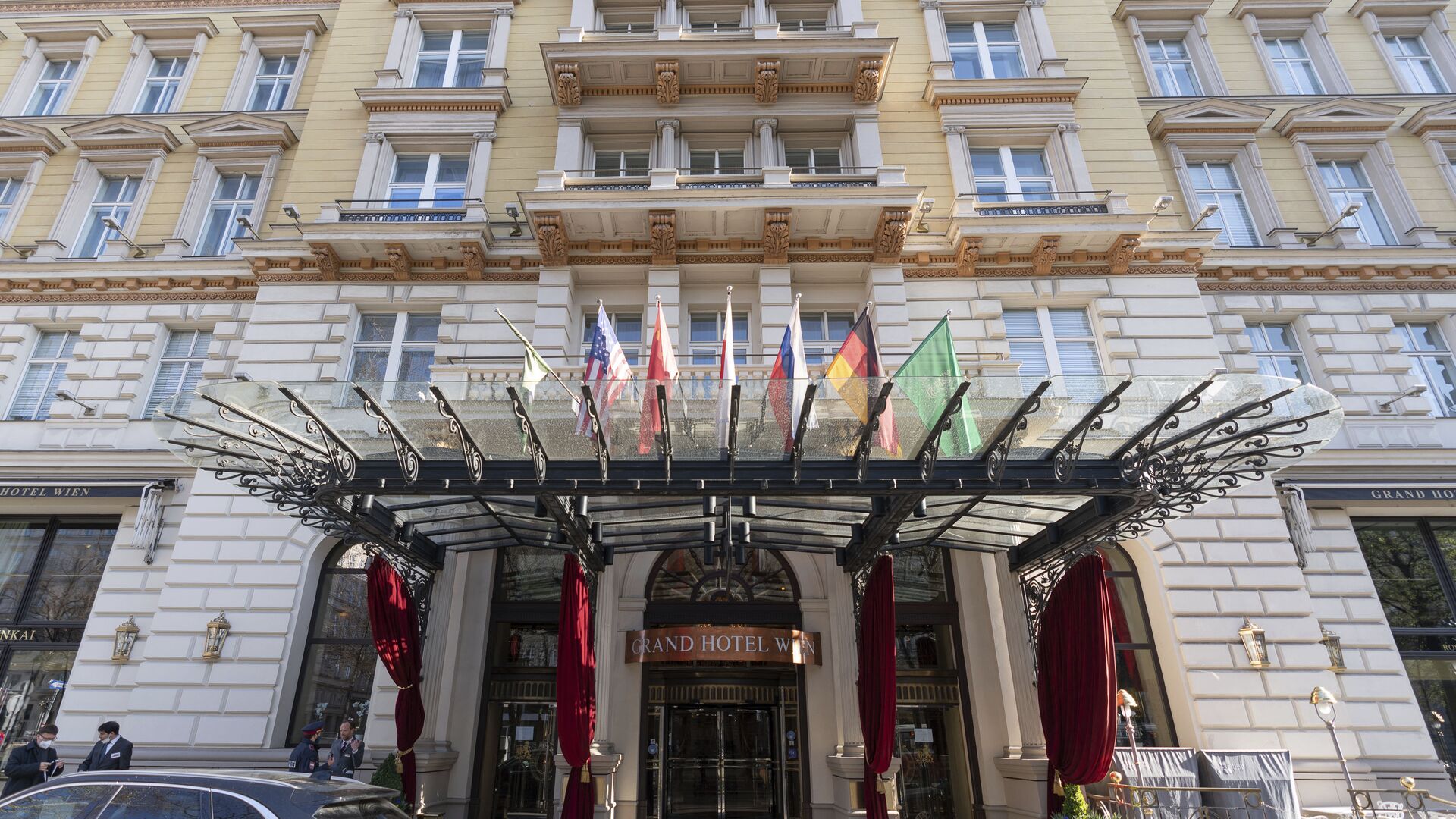https://sputnikglobe.com/20230131/is-there-chance-of-revival-russian-envoy-says-its-premature-to-call-jcpoa-dead-1106850859.html
Is There Chance of Revival? Russian Envoy Says It's Premature to Call JCPOA Dead
Is There Chance of Revival? Russian Envoy Says It's Premature to Call JCPOA Dead
Sputnik International
Russian Permanent Representative to International Organizations in Vienna Mikhail Ulyanov in an interview with Sputnik expressed his opinion on the situation around the JCPOA, IAEA Board of Governors resolution on Iran and Iran's nuclear program
2023-01-31T12:46+0000
2023-01-31T12:46+0000
2023-01-31T13:07+0000
world
joint comprehensive plan of action (jcpoa)
international atomic energy agency (iaea)
iran
interviews
us
european union (eu)
https://cdn1.img.sputnikglobe.com/img/07e5/04/0d/1082619671_0:174:3000:1862_1920x0_80_0_0_6a67d36f4028047a455b0e7b09cfc9ef.jpg
Russian Permanent Representative to International Organizations in Vienna Mikhail Ulyanov in an interview with Sputnik expressed his opinion on the situation around the JCPOA, the IAEA Board of Governors resolution on Iran, and Iran's nuclear program. Sputnik: The Vienna talks have been going on since April 2021. A year ago, you said that there had been tremendous progress since then. How would you characterize the situation with the JCPOA deal now? What steps are needed to complete it? How long do you think the diplomatic marathon to restore the JCPOA will take?Mikhail Ulyanov: Unfortunately, the current situation around the JCPOA can be characterized as a stalemate. There have been no more or less serious diplomatic talks since the beginning of September. Nevertheless, it would be premature to say that the JCPOA is dead. There is a chance that the deal could be revived. This requires a political decision by all parties to the Vienna process to return to the negotiating table in order to bring the process to fruition. This will not take much time. Iran has the political will to complete the process. The same can be said of us and of China. But Western participants do not have such political will at this stage.Sputnik: Russia voted against the November IAEA Board of Governors resolution on Iran. You said that this creates an even more difficult atmosphere on the unresolved safeguards issues and around the JCPOA. What does that specifically reflect?Mikhail Ulyanov: Our warnings at the November meeting of the IAEA Board of Governors about the anti-Iran resolution pushed by the United States, Britain, Germany, and France were fully confirmed. In this case, the Western countries did not learn any lessons from a similar situation that occurred at the June meeting of the IAEA Board of Governors, where they also supported the anti-Iran resolution. Thus, immediately after the adoption of the November resolution, which, by the way, was not supported by consensus, Iran postponed the previously planned visit of IAEA representatives to Tehran. In addition, Iran responded by beginning to produce 60% of its uranium at the Fordow underground facility, which it had never done before. Accordingly, the initiative with this resolution made it clear to us that a revival of the JCPOA is clearly not on the agenda of the Western participants in the Vienna talks. This situation continues to this day.It is also important to note that in our communications with the Iranian side, we emphasize the need to ensure meaningful interaction with the IAEA as soon as possible on the remaining issues related to the uranium particles found in Iran. We believe that the Agency's Secretariat will also approach the interaction with Iran in a professional, impartial, and reasonable manner.Sputnik: Since the US withdrawal from the JCPOA in 2018, Tehran has made progress in developing its nuclear program, and the current situation is different than it was in 2015. Is there any discussion with Iran about whether it will curb its nuclear program? Will Iran comply with all the requirements of the JCPOA, which would require it to significantly reduce, if not destroy, all the nuclear infrastructure it has acquired since 2018? How far has Iran gone? Is Iran breaching the limits set by the JCPOA? Is this issue under discussion?Mikhail Ulyanov: In fact, the US has done everything possible to advance Iran's nuclear program both quantitatively and qualitatively. In this, it must be said, Washington has succeeded - the Iranians have exceeded the limits set by the JCPOA in almost all parameters, and have advanced far beyond what they had even before the deal was concluded in 2015. All of this, however, is under the full and unrelenting supervision of the IAEA. Moreover, the steps Iran has taken beyond the JCPOA are reversible, and it takes very little to return to the Vienna negotiating table and restore the nuclear deal. As I said, this can be done fairly quickly, in a matter of days.The development of Iran's nuclear program is discussed in principle at every meeting of the IAEA Board of Governors, but again, this has nothing to do with real political and diplomatic processes.Sputnik: When you talked about a "political deal" between Iran and the IAEA, you said that no "deal" is needed for this, and the problem is that Iran does not trust the Western partners involved in the Vienna talks and members of the IAEA Board of Governors. There are indeed reasons for this mistrust. Would it be reasonable to suggest that the EU review the composition of the participants in the Vienna talks? Are there experts in its structures with whom a constructive dialog could be conducted?Mikhail Ulyanov: The idea of revising the composition of participants in the Vienna talks seems highly questionable. The JCPOA is the product of difficult but successful years of diplomatic efforts within the framework of the current composition of participants in the process. Changing it would be counterproductive.The question of Western experts with whom one can have a constructive dialog should be answered in the affirmative. We saw this during the Vienna negotiations on the restoration of the JCPOA. Both the US and the European External Action Service, as well as individual European countries, made positive contributions to the development of the "package" of the agreement, which was almost agreed upon.
https://sputnikglobe.com/20230116/iran-nuclear-deal-how-us-failed-historic-breakthrough--opened-door-to-seven-years-of-controversy-1106401574.html
https://sputnikglobe.com/20221210/iaea-head-says-glimmer-of-hope-remains-to-restore-dialogue-on-jcpoa-revival-1105334434.html
iran
Sputnik International
feedback@sputniknews.com
+74956456601
MIA „Rossiya Segodnya“
2023
Sputnik International
feedback@sputniknews.com
+74956456601
MIA „Rossiya Segodnya“
News
en_EN
Sputnik International
feedback@sputniknews.com
+74956456601
MIA „Rossiya Segodnya“
Sputnik International
feedback@sputniknews.com
+74956456601
MIA „Rossiya Segodnya“
situation around the jcpoa, iran's nuclear program
situation around the jcpoa, iran's nuclear program
Is There Chance of Revival? Russian Envoy Says It's Premature to Call JCPOA Dead
12:46 GMT 31.01.2023 (Updated: 13:07 GMT 31.01.2023) Earlier in January, Iranian Foreign Minister Hossein Amir-Abdollahian said that Tehran was ready to renew talks on the revival of the Iran nuclear agreement, formally known as the Joint Comprehensive Plan of Action (JCPOA), but the potential negotiations must be based on a realistic approach without any preliminary conditions.
Russian Permanent Representative to International Organizations in Vienna Mikhail Ulyanov in an interview with Sputnik expressed his opinion on the situation around the JCPOA, the IAEA Board of Governors resolution on Iran, and Iran's nuclear program.
Sputnik: The Vienna talks have been going on since April 2021. A year ago, you said that there had been tremendous progress since then. How would you characterize the situation with the JCPOA deal now? What steps are needed to complete it? How long do you think the diplomatic marathon to restore the JCPOA will take?
Mikhail Ulyanov: Unfortunately, the current situation around the
JCPOA can be characterized as a stalemate. There have been no more or less serious diplomatic talks since the beginning of September. Nevertheless, it would be premature to say that the JCPOA is dead. There is a chance that the deal could be revived. This requires a political decision by all parties to the Vienna process to return to the negotiating table in order to bring the process to fruition. This will not take much time. Iran has the political will to complete the process. The same can be said of us and of China. But Western participants do not have such political will at this stage.
Sputnik: Russia voted against the November IAEA Board of Governors resolution on Iran. You said that this creates an even more difficult atmosphere on the unresolved safeguards issues and around the JCPOA. What does that specifically reflect?
Mikhail Ulyanov: Our warnings at the November meeting of the
IAEA Board of Governors about the anti-Iran resolution pushed by the United States, Britain, Germany, and France were fully confirmed. In this case, the Western countries did not learn any lessons from a similar situation that occurred at the June meeting of the IAEA Board of Governors, where they also supported the anti-Iran resolution. Thus, immediately after the adoption of the November resolution, which, by the way, was not supported by consensus, Iran postponed the previously planned visit of IAEA representatives to Tehran. In addition, Iran responded by beginning to produce 60% of its uranium at the Fordow underground facility, which it had never done before. Accordingly, the initiative with this resolution made it clear to us that a revival of the JCPOA is clearly not on the agenda of the Western participants in the Vienna talks. This situation continues to this day.
It is also important to note that in our communications with the Iranian side, we emphasize the need to ensure meaningful interaction with the IAEA as soon as possible on the remaining issues related to the uranium particles found in Iran. We believe that the Agency's Secretariat will also approach the interaction with Iran in a professional, impartial, and reasonable manner.

16 January 2023, 15:20 GMT
Sputnik: Since the US withdrawal from the JCPOA in 2018, Tehran has made progress in developing its nuclear program, and the current situation is different than it was in 2015. Is there any discussion with Iran about whether it will curb its nuclear program? Will Iran comply with all the requirements of the JCPOA, which would require it to significantly reduce, if not destroy, all the nuclear infrastructure it has acquired since 2018? How far has Iran gone? Is Iran breaching the limits set by the JCPOA? Is this issue under discussion?
Mikhail Ulyanov: In fact, the US has done everything possible to advance Iran's nuclear program both quantitatively and qualitatively. In this, it must be said, Washington has succeeded - the Iranians have exceeded the limits set by the JCPOA in almost all parameters, and have advanced far beyond what they had even before the deal was concluded in 2015. All of this, however, is under the full and unrelenting supervision of the
IAEA. Moreover, the steps Iran has taken beyond the JCPOA are reversible, and it takes very little to return to the Vienna negotiating table and restore the nuclear deal. As I said, this can be done fairly quickly, in a matter of days.
The development of Iran's nuclear program is discussed in principle at every meeting of the IAEA Board of Governors, but again, this has nothing to do with real political and diplomatic processes.

10 December 2022, 19:41 GMT
Sputnik: When you talked about a "political deal" between Iran and the IAEA, you said that no "deal" is needed for this, and the problem is that Iran does not trust the Western partners involved in the Vienna talks and members of the IAEA Board of Governors. There are indeed reasons for this mistrust. Would it be reasonable to suggest that the EU review the composition of the participants in the Vienna talks? Are there experts in its structures with whom a constructive dialog could be conducted?
Mikhail Ulyanov: The idea of revising the composition of participants in the Vienna talks seems highly questionable. The JCPOA is the product of difficult but successful years of diplomatic efforts within the framework of the current composition of participants in the process. Changing it would be counterproductive.
The question of Western experts with whom one can have a constructive dialog should be answered in the affirmative. We saw this during the Vienna negotiations on the restoration of the JCPOA. Both the US and the European External Action Service, as well as individual European countries, made positive contributions to the development of the "package" of the agreement, which was almost agreed upon.




